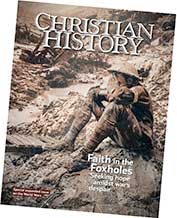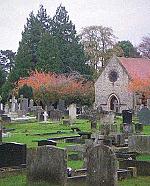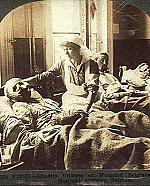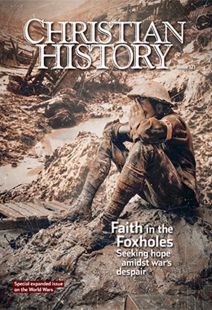“The world must be made safe for democracy”
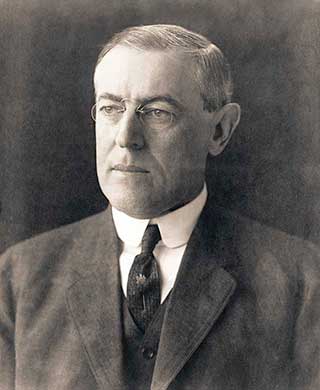
[Woodrow Wilson—Wikimedia]
When President Woodrow Wilson ran for re-election in 1916, one of his campaign slogans was “He kept us out of war.” But his inaugural address on March 5, 1917, acknowledged wartime reality.
The tragic events of the thirty months of vital turmoil through which we have just passed have made us citizens of the world. There can be no turning back. &hellip
We are being forged into a new unity amidst the fires that now blaze throughout the world. In their ardent heat we shall, in God’s Providence, let us hope, be purged of faction and division, purified of the errant humors of party and of private interest, and shall stand forth in the days to come with a new dignity of national pride and spirit. Let each man see to it that the dedication is in his own heart, the high purpose of the nation in his own mind, ruler of his own will and desire.
I stand here and have taken the high and solemn oath to which you have been audience because the people of the United States have chosen me for this august delegation of power and have by their gracious judgment named me their leader in affairs.
I know now what the task means. I realize to the full the responsibility which it involves. I pray God I may be given the wisdom and the prudence to do my duty in the true spirit of this great people. I am their servant and can succeed only as they sustain and guide me by their confidence and their counsel.
The thing I shall count upon, the thing without which neither counsel nor action will avail, is the unity of America—an America united in feeling, in purpose and in its vision of duty, of opportunity and of service. We are to beware of all men who would turn the tasks and the necessities of the nation to their own private profit or use them for the building up of private power.
United alike in the conception of our duty and in the high resolve to perform it in the face of all men, let us dedicate ourselves to the great task to which we must now set our hand. For myself I beg your tolerance, your countenance and your united aid.
The shadows that now lie dark upon our path will soon be dispelled, and we shall walk with the light all about us if we be but true to ourselves—to ourselves as we have wished to be known in the counsels of the world and in the thought of all those who love liberty and justice and the right exalted.
Order Christian History #121: Faith in the Foxholes in print.
Subscribe now to get future print issues in your mailbox (donation requested but not required).
Less than a month later, on April 2, 1917, Wilson asked Congress for a declaration of war in these words:
The world must be made safe for democracy. Its peace must be planted upon the tested foundations of political liberty. We have no selfish ends to serve. We desire no conquest, no dominion. We seek no indemnities for ourselves, no material compensation for the sacrifices we shall freely make. We are but one of the champions of the rights of mankind. We shall be satisfied when those rights have been made as secure as the faith and the freedom of nations can make them. &hellip
But the right is more precious than peace, and we shall fight for the things which we have always carried nearest our hearts—for democracy, for the right of those who submit to authority to have a voice in their own Governments, for the rights and liberties of small nations, for a universal dominion of right by such a concert of free peoples as shall bring peace and safety to all nations and make the world itself at last free.
To such a task we can dedicate our lives and our fortunes, everything that we are and everything that we have, with the pride of those who know that the day has come when America is privileged to spend her blood and her might for the principles that gave her birth and happiness and the peace which she has treasured. God helping her, she can do no other.
This article is from Christian History magazine #121 Faith in the Foxholes. Read it in context here!
By Woodrow Wilson
[Christian History originally published this article in Christian History Issue #121 in 2017]
Next articles
No atheists in the foxholes?
Some people found religion in the experience of wartime, but others lost it
Kevin L. WaltersSupport us
Christian History Institute (CHI) is a non-profit Pennsylvania corporation founded in 1982. Your donations support the continuation of this ministry
Donate



